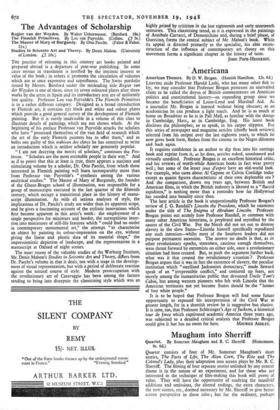Americana
American Themes. By D. W. Brogan. (Hamish Hamilton. 12s. 6d.) LEAVING aside Professor Harold Laski, who has many other fish to fry, we may consider that Professor Brogan possesses an unrivalled claim to be called the doyen of British commentators on American politics and constitutional history—an expanding group since we became the beneficiaries of Lease-Lend and Marshall Aid. As a journalist Mr. Brogan is learned without being obscure; as an academician he can produce a light touch. And he is as much at home on Broadway as he is in Pall Mall, as familiar with the doings in Cambridge, Mass., as in Cambridge, Eng. His latest book discloses the philosopher, so to speak, in his carpet slippers. For this series of newspaper and magazine articles (chiefly book reviews) selected from his output over the last eighteen years, to which he now gives book form, flashes from the cinema to the Negro dilemma and back again.
It requires confidence in an author to dip thus into his cuttings book and reprint from it, as he does, articles naked, unashamed and virtually unedited. Professor Brogan is an excellent historical critic, and his reviews of worth-while American books in fact wear pretty well ; but some of the lesser jeux d'esprit have an old-world look. For example, who cares about Al Capone or Calvin Coolidge today except as quaint figures characteristic of their own deplorable era ? And the comparison, drawn ten years ago, between British and American films, in which the British industry is likened to a " flaccid aspidistra," is nothing more than a reminder how far Hollywood has receded into banality since then.
The best article in the book is unquestionably Professor Brogan's review of J. G. Randall's Lincoln the President, which he examines under the title of The Enigma of Abraham Lincoln. Professor Brogan points out acutely how Professor Randall, in common with many other American historians, is perplexed and mystified by the causes of the Civil War. For the North did not set out to destroy slavery in the slave States—Lincoln himself specifically repudiated any such intention—whilst most of the Southern leaders did not purpose permanent secession. The answer no doubt is that, as in other revolutionary epochs, statesmen, cautious enough themselves, were thrust forward by extremists on either side, once a revolutionary situation had been created. But, to push the argument, farther back, what was it that created the revolutionary situation'? Professor Brogan argues that it was in fact the existence of slavery, the peculiar institution which " sterilised Jacksonian democracy," made Seward speak of an " irrepressible conflict," and conjured up fears, not merely among the humanitarian public that devoured Uncle Tom's Cabin, but among western pioneers who felt with Lincoln that the American territories not yet become States should be the " homes of free white people."
It is to be hoped that Professor Brogan will find some future opportunity to expound his interpretation of the Civil War at greater length, for in a shortish review he is suggestive but elusive. It is time, too, that Professor Schlesinger's Age of 7ackson, a historical tour de force which captivated academic America three years ago, was subjected to a detailed critical analysis that Professor Brogan
could give it but has no room for here. MAURICE ASHLEY.


































 Previous page
Previous page